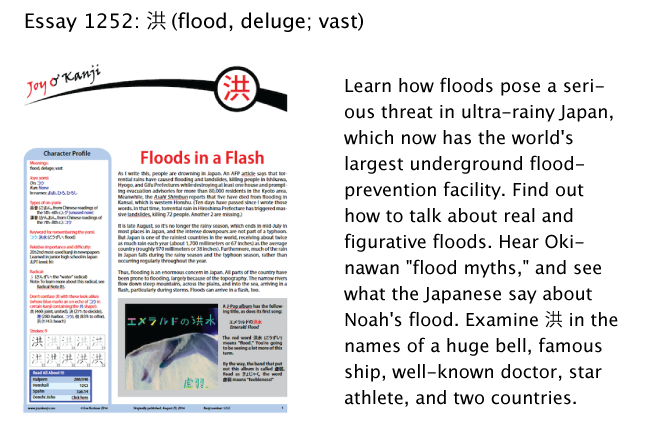Drawn Like a Dowser
I didn't plan this, but my new essay on the flood kanji 洪 coincides "perfectly" with a spate of flooding and landslides in Japan (if anything could be perfect about those catastrophes). Meanwhile, over here in California the drought is so severe that taps and wells have run dry in some communities. A San Francisco Chronicle article this week explored how desperate vintners and farmers have turned to "dowsers" to locate groundwater. Also known as water witches, dowsers use forked sticks, rods, or pendulums to guide them to hidden water.
For me, writing about 洪 proved to be a dowser that helped unearth fascinating expressions.
For instance, the keyword in this sentence is 大洪水 (だいこうずい: big flood), but that isn't what caught my eye:
一部の住民が様子見の態度を取る一方で他の者は大洪水に備えた。
Some residents took a wait-and-see attitude, while others prepared for heavy flooding.
一部 (いちぶ: some); 住民 (じゅうみん: residents); 様子見 (ようすみ: wait-and-see); 態度を取る (たいどをとる: to take an attitude); 一方 (いっぽう: on the other hand); 他 (ほか: other); 者 (もの: person); 備える (そなえる: to prepare)
The blue word is quite intriguing. Here it is again:
様子見 (ようすみ: wait-and-see) appearance of things (1st 2 kanji) + to see
I suppose people take their time observing the appearance (様子) of some situation to see (見) how it develops.
Speaking of having things catch my eye, the eyes have it in this next sentence in which the red 洪大 (こうだい) means "tremendous":
アフリカの洪大な手つかずの資源に目をつけている国もある。
Some countries have their eyes on the tremendous untouched resources in Africa.
手つかず (てつかず: untouched); 資源 (しげん: resources); 目をつける (めをつける: to have an eye on); 国 (くに: country)
Actually, the hands have it, too, because I really like this term:
手つかず (てつかず: untouched)
It combines 手 (hand) with つかず, which is the archaic or literary version of つかない (付かない). Here is the way to make sense of this:
手が付く means "to be touched."
手つかず is its archaic negative version with the が dropped.
Therefore, 手つかず means "untouched." Although つかず is the negative form of a verb, 手つかず can work as a の adjective, as in the sentence above.
Above all, I'm drawn like a dowser to water when I see this expression:
目をつける (めをつける: to have an eye on)
Someone attaches (つける) an eye (目) to something.
Speaking of water, the next word is quite unexpected:
水臭い (みずくさい: standoffish) water + stinking of
I came upon this common term in writing the forthcoming essay 1970 on 俺 (おれ), in which I discuss a rather complicated phrase:
俺お前の間柄
very close relationship between two men
お前 (おまえ: you); 間柄 (あいだがら: relationship)
This whole expression appears in the following sentence:
俺お前の間柄で隠し事は水臭いよ。
Why didn’t you tell me? We are supposed to be friends!
隠し事 (かくしごと: secret); 水臭い (みずくさい: standoffish)
There's so much to explore and understand here! Gogen helps us out with the water-related mystery, explaining that 水臭い literally refers to food or drinks that are too watery, which is to say "flavorless" or "bad-tasting." By association, the word figuratively means "person whose love is fading or whose friendship feels cold and distant."
That kind of water might leave a bad taste in your mouth, so let me change that by introducing an intriguing sentence from essay 1167 on 恐 (fear; dread; awe). The keyword is 恐れ入る (おそれいる), which has many meanings but translates here as "to be amazed; be filled with awe; be surprised":
立て板に水の如きプレゼンテーション、恐れ入りました。
Your presentation was so smooth and fluent. What can I say?
立て板に水 (たていたにみず: fluency); 如き (ごとき: like)
The blue part is a set phrase indicating great fluency. This is because if you pour water (水) on an upright board (立て板), the liquid will flow down smoothly without stopping for anything. In the same way, 立て板に水のようにしゃべる means "to rattle on and on."
This explanation puts the "fluent" back in "effluent"! How many of us "hear" the fluidity in the word "fluent"?
I have new respect for water after this dousing—or should I say "dowsing"?!
Here's a sneak preview of the newest essay:

Have a great weekend!

Comments